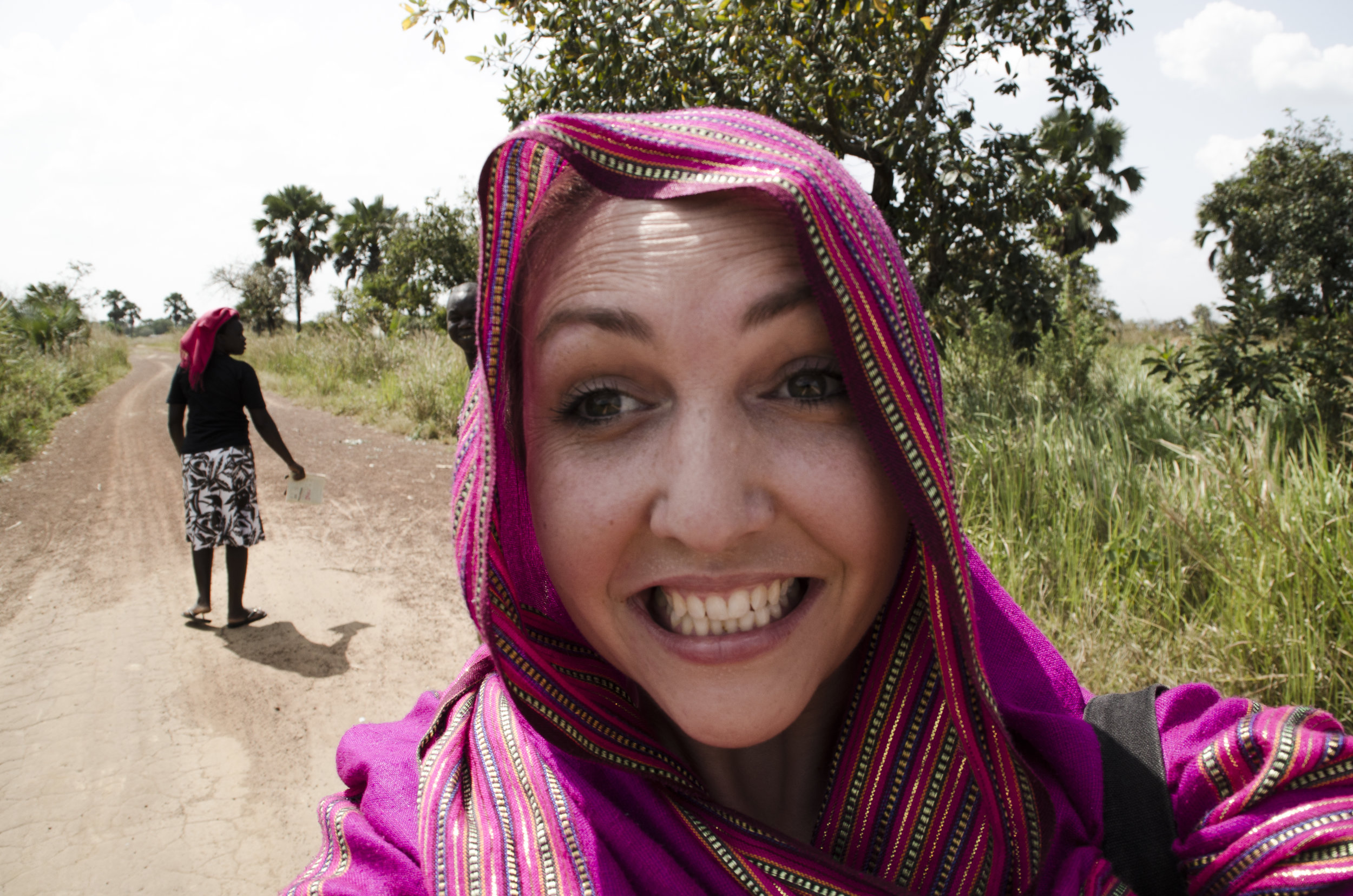Ever wonder what it's like to volunteer with Tutapona? Read this story from Candice Lassey to find out.
Pageya // Acholiland // Northern Uganda
6.30am. I can see the soft glow of sunlight sneaking under the door to my hut as the sun rises over the Northern Ugandan plains. As the peaceful village slowly awakens I look over at Irene, my Tutapona host for the week. She sleeps quietly on her mat, draped by a mosquito net hung from the grass thatched roof.
I hear the chatter of children and the splash of water – it’s bathing time! I quietly sit up and fold my mosquito net up to the roof, trying to find my shoes in the dim light. The soft light streams in as I open the tiny door and I take a deep breath of the fresh village air. I grab my camera: It’s photo time.
I’ve been here for four days now and the kids are finally used to me, although that could have something to do having an unlimited supply of stickers and sweeties and a soccer ball stashed in the hut. Some of the children smile and wave, some of them point to the colourful stars on the foreheads, ears and hands: they still have their stickers from yesterday. There is a mother bathing her youngest, an eight-month old little boy who is still a bit hesitant of me. I make my way over to her. “Icoo maber” I say with a morning greeting. “Picture?” I ask, holding up my camera in its case. She smiles and eagerly nods “Aya!” I take out my camera and the children come running, some half-dressed, some still brushing their teeth.
The giggles are explosive as they pose for their pictures. There is a sweet innocence about it all as the children jump around, smiling and laughing. I can’t help but wonder how different life was in this village 15 years ago at the height of the L.R.A. tyranny. Would these sweet, innocent children have survived? Would they have been counted amongst the tens of thousands of children who were abducted and conscripted into child soldiers? The sombre thought settles over me as I sit in the swirling dust. I silently pray that these children never have to experience those atrocities. I hope they can keep their innocence, unspoiled by the horrors of war that relentlessly haunt their parents and older siblings.
That is why Tutapona is here – to work with the victims of the conflict. Empower, the trauma rehabilitation program they deliver is designed to bring transformation and healing to an entire community. It’s a tough but successful process and in less than a week the results are already obvious.
7.15am. As I walk back to the hut I see an elderly lady with a tall walking stick coming across the field for a one on one session with us. She’s hardly slept, kept awake by a stomach ulcer that has been giving her pain for years. She is worried about crops and about her grandson, Opiyo, who has a physical disability caused by childhood polio. She begins to talk about her experiences during the L.R.A. raids and how they still affect her today. She feels very anxious, jumping at loud noises, fearing that something bad is always going to happen. She has nightmares that her house is burning, or that she is being shot at by her children. We talk her through some coping strategies and after an hour she leaves, just as two men appear at the door. The steady stream of people continues throughout the morning and through lunch; a meal of rice, beans and vegetables purchased from the markets the night before.
1.20pm. After lunch the scorching sun hits its peak and everyone quietly retreats into the shade of their mud huts. The silence is interrupted by the cries of a child echoing out across the village. Irene looks out the door and sees Opiyo, sitting alone in the dirt. She calmly walks over to the boy, picks him up and brings him back to the hut where she bathes him and then brings him inside. Irene calms the boy down and gives him some lunch and immediately the crying stops. She pulls up some music videos on her laptop, and Opiyo is captivated until the soccer ball comes out. For the next 40 minutes we sit on my mat rolling the ball back and forth. It acts as therapy for his underdeveloped muscles and poor motor skills, a result of his infanthood illness. He laughs as I throw the ball into the air and let it land on my head. He tries to copy me but loses his balance and falls to the floor. I wait for him to cry, but instead hear joyful squeals of laughter. The kid is hilarious!
2.00pm. We head toward the village centre, a 20-minute walk in the sweltering heat. I wrap a scarf around my head in an attempt to create some shade, bringing giggles galore from the children who sit in the shade of their houses. The team discuss the plan for the afternoon; they are going to squeeze in two sessions today because there are clan meetings coming up and they don’t want anyone to miss out on anything. Today there will be an opportunity to share stories, and there will be some fun activities to illustrate the power of forgiveness.
Not long after we arrive the session begins and immediately there is laughter. Teenagers and adults participate in an activity to see who can hold a rock in their outstretched hand the longest. After several minutes it comes down to a 14-year-old boy and a 70-year-old woman, neither of whom are willing to lose to the other. The villagers start cheering for their favourite and finally the young boy relents. There are woops and shrill ululations as they celebrate her victory. The lesson is simple but effective: it may seem easy to hold onto your anger at first, but eventually the burden becomes too much to carry.
A volunteer steps forward and she is tied up, demonstrating the bondage of unforgiveness. Alex ties a knot for every unforgiven offence until she can no longer even manage a wriggle, restrained by the paralysing hurt, anger and bitterness of her past. Some are laughing at her attempts to move, others become solemn as the lesson becomes obvious. Their own inability to forgive the atrocities of the past is hurting them more than the offenders. Then, as each offence is forgiven a knot is gently undone until finally she is free again. The lesson is very clear: Forgiveness equals freedom.
5.20pm. The session ends with rollcall – 169 attendees in total. It’s a big crowd and Alex and Irene are concerned that they don’t have enough time to reach every individual. They plan to return for their Follow Up program, hoping that it will give them further opportunities to work with everyone. It’s an issue they face in every village – so many broken people, so little time and resources.
8.30pm. Before the moon rises I quickly duck out for a “shower”. The bathing area is a short walk from the huts; a shonky three walled structure with gaps large enough to see straight through. I hang my sarong to make a fourth wall and hope that they moon stays hidden for the next few minutes while I hastily wash from a bucket of warm water. When I return to the hut a man and one of his wives are with the team having some marriage counseling.
11.00pm. The couple finally bid us “But maber”, good night. Everyone is exhausted but there is a strong sense of accomplishment, knowing that so many people have made the vital decision to forgive the offences of the past. As we turn off the solar powered light that illuminates the hut, the village is silent once again. My head barely hits the pillow before my mind sets to work, reflecting on the activities of the day. I can hear Irene quietly praying from her mat and I do the same. I thank God for my day, for the safety and hope and peace that I have. I pray for the children to remain innocent. I pray for education opportunities and for health, for their crops to prosper and grow. I pray for the parents, the older siblings, and the grandparents who are all working hard towards reconciliation and rehabilitation. I pray that the things they have learnt would sink from their heads into their hearts. I blink back tears as I think of the stories they have shared and I pray for peace as they sleep. I pray for their futures. I pray that as their days end so would their anxieties, and as the new dawn prepares to rise, their healing will come.
Candice Lassey








